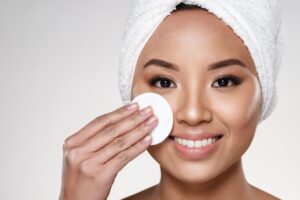If our body is a large empire, the skin barrier can be described as a moat that keeps intruders away. It’s like the outer wall that bears the brunt of the weather and keeps everything nasty out. This part of the body is crucial for keeping your skin healthy and happy, as well as protecting the delicate inner layers of the skin.
So, scientifically, what is the skin barrier?
This can be described as the outermost layer of the skin, known as the stratum corneum. It is made up of tough skin cells called corneocytes, which are constantly shed and replaced, keeping the surface of the skin fresh.
Furthermore, the corneocytes are held together by a special mix of fats and oils called lipids, which fill the gaps between the cells. These lipids are ceramides, cholesterol, and fatty acids, and they work together to form a tight seal, keeping the bad stuff out and the good stuff in.
But like any good security system, the skin barrier can be compromised. Habits like using harsh soaps or scrubbing too hard can compromise it.
Likewise, environmental factors like extreme weather can also weaken this barrier. And when this happens, the skin can be severely affected, leading to dryness, itchiness, redness, and irritation. These are the warning signs that your skin barrier is calling for some TLC.
So let’s look closer at the causes of skin barrier damage.
Causes of skin barrier damage
Use of harmful products
Sometimes, the things we use to care for our skin can end up hurting it. Harsh soaps and cleansers with strong detergents are very harmful to the skin, stripping away natural oils and disrupting the delicate balance of the skin barrier.
Products with alcohol or fragrance can also be irritating and weaken the barrier.

Over-exfoliation is another common cause. Scrubbing too hard or using harsh exfoliating products too often can damage the skin cells and disrupt the barrier’s function.
Environmental factors
Mother Nature can sometimes be a bit rough on our skin barrier. Extreme weather conditions like hot summer sun, cold winter winds, and dry air can all wreak havoc on the skin. The sun’s harsh UV rays damage the skin cells and break down the lipids in the barrier, while dry air sucks the moisture out of your skin, leaving it parched and vulnerable.
Environmental pollutants like dust, dirt, and other airborne particles can also be potential enemies, irritating the skin and disrupting the barrier’s function.
Lifestyle Choices
What we do with our bodies can significantly impact our skin barrier, even in unexpected ways. Stress, for example, can lead to increased inflammation and weaken the barrier’s ability to protect itself. Not getting enough sleep can also negatively impact skin health since the skin repairs itself during sleep.
Diet plays a role, too. If you’re not nourishing your body with plenty of fruits, vegetables, and healthy fats, your skin won’t have the building blocks to maintain a strong barrier.
And let’s not forget smoking – this practice reduces blood flow to the skin, hindering its ability to repair itself and maintain a healthy barrier.
Internal factors
Some internal factors contribute to skin barrier damage. Certain skin conditions, such as eczema and psoriasis, can disrupt the barrier’s function.
Likewise, hormonal changes, such as those experienced during pregnancy or menopause, can also affect the skin barrier. Even genetics can play a role, with some people simply being more predisposed to having a weaker skin barrier.
Repairing a Compromised Barrier with Hydrating Ingredients
Now that we know the enemies of a healthy and strong skin barrier let’s see how you can make things right when this barrier is compromised.
Remember when I mentioned that the skin barrier keeps the bad stuff out and the good stuff in? Exactly! One of these good stuff is moisture.

Adequate moisture is essential for keeping skin plump and hydrated, and the skin barrier helps lock in this moisture by preventing excessive water loss and keeping the skin from drying out. It also regulates the skin’s temperature.
Tailor your skincare routine to boost the hydrating capacity of your skin barrier to help it perform its different functions. Look for ingredients like ceramides and hyaluronic acid in your skincare products. These can help strengthen and replenish the barrier.
Hyaluronic acid can also attract water from the deeper layers of your skin and the environment, plumping up your skin cells and keeping them hydrated.
Occlusive can also be helpful, especially for preventing further moisture loss. Skincare ingredients like petrolatum, shea butter, and mineral oil can form a protective film on the skin’s surface, creating a barrier that traps moisture inside and prevents it from evaporating.
However, it’s important to use these ingredients with caution. Only include them in your skincare routine if you’ve confirmed, through a patch test, that they suit your skin.
Gentle Skincare Routine for Barrier Repair
As I mentioned earlier, the skin barrier protects the skin. But how do we keep this amazing barrier working at its best? The good news is that there are simple things you can do to achieve this.
For instance, gentle cleansing, fragrance-free products, and regular moisturizing are all effective tips for protecting the skin barrier.
Over-exfoliation can disrupt the delicate balance of the skin barrier. So, stick to gentle exfoliation once or twice a week. This practice can help keep your skin fresh and smooth. Also, since sun exposure can significantly damage the skin barrier, it’s important to wear sunscreen regularly.
One last thing…
Think of your skin barrier as your skin’s best friend, the silent guardian keeping it healthy and protected. By understanding its role and giving it the care it deserves, you can almost always keep your skin looking and feeling its best.
Let me add, though, that patience is key in all of this. Repairing the skin barrier takes time and consistency, so don’t be discouraged if you don’t see results overnight.
Stick to your routine, and you’ll eventually see a noticeable improvement in your skin’s texture and overall health.











